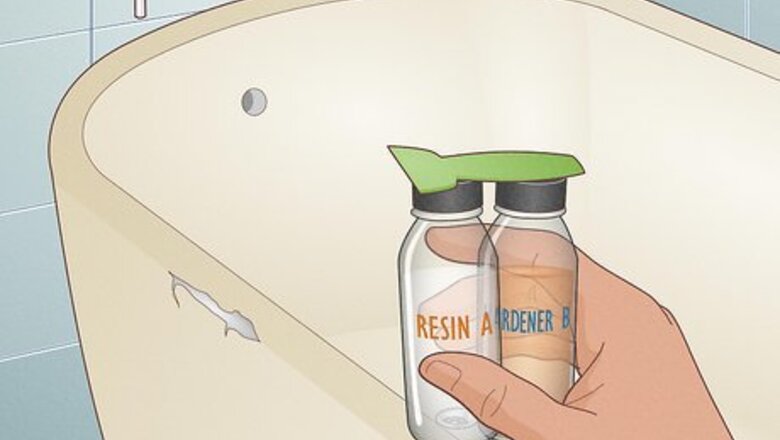
views
- Buy an epoxy compound bathtub repair kit in your tub’s material and color. Clean the area with a sponge and tub cleaner and apply painter’s tape around the chip.
- Follow the directions in your kit to mix the components. 2-part kits require you to mix both components while 1-part kits just require you to shake the bottle.
- Apply the compound to the chipped area with a disposable paintbrush, plastic knife, or spatula. Let the epoxy dry, then sand the area down until it’s flush.
Repairing Small Chips in a Bathtub
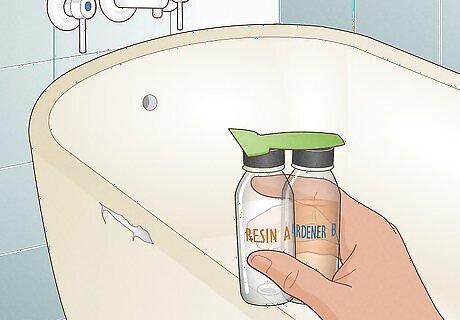
Buy a bathtub chip repair kit that matches your tub’s color and material. You can either buy a 1-part compound kit or a 2-part compound kit that requires you to mix the two bottles before applying. There are epoxy compound repair kits for all kinds of tub materials, including ceramic, porcelain, fiberglass, and enamel. Most kits come in shades of white, black, or gray to match the most common bathtub colors. Repairing a small chip in your bathtub usually costs $10 to $35 for the entire project. Home renovation and repair specialist Art Fricke says that if your tub “has a lot of scratches or is discolored or has a lot of dings and dents,” you may want to get it refinished instead. Art Fricke also says that a steel or acrylic tub “can't really be sanded and recoated.” You may want to replace it instead. If your tub is leaking, overly worn, or cracked, you may have to replace it instead. The repair might not match your tub completely. Sanding it down helps blend out the patch, but you might still see a difference between the tub and the compound.
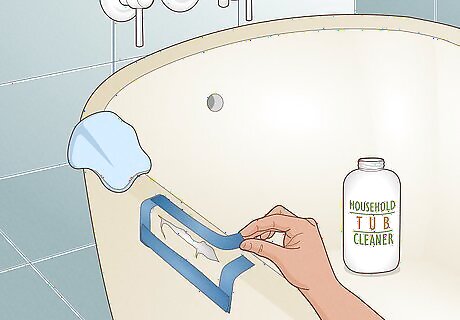
Clean the damaged area and apply painter’s tape around the chip. Use warm water and dish detergent or a household tub cleaner to clean the chipped area. Thoroughly dry the area with a clean lint-free cloth. Use painter’s tape or masking tape to outline the edge of the chip and protect the rest of the area from the epoxy compound. If the chip is on the wall of the tub, apply extra pieces of tape to the area below it to catch any dripping epoxy. You can also use acetone or rubbing alcohol to clean the area. Any product that removes grease and soap scum can work to clean the chip.
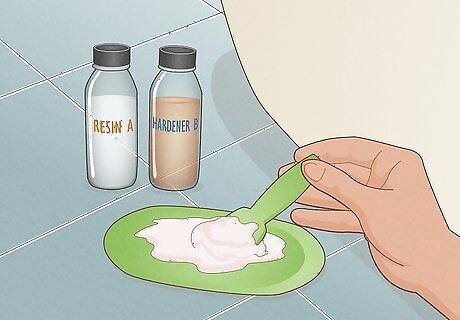
Follow the directions in your epoxy kit to mix the components. For 2-part compounds, follow the instructions to mix together both parts on a scrap piece of cardboard or paper until the compound reaches an even color and consistency. For 1-part compounds, mix the bottle according to the directions—this typically requires shaking the bottle. Some 2-part epoxy compound comes in a putty, while others come in a paste. Each kit can make several repairs, so try not to use the compounds all at once.
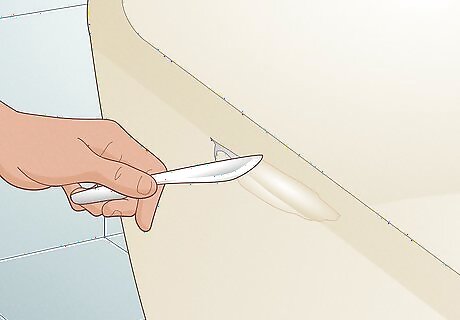
Apply a thin layer of compound with a small paint brush or plastic knife. Scoop up a small amount of the epoxy with your chosen utensil. Spread it in a thin layer over the chip by working in 1 direction and smooth out any spots where it pools. Start with a small amount of epoxy and add more layers so you don’t put too much on, which takes more time to dry and can cause the epoxy to run. If the color of the epoxy is slightly off when you put on the first coat, it might be the metal showing through. However, if it seems like the color is way off, stop and order a different color. Make sure that anything you use to apply the epoxy is disposable. It can be difficult to get the epoxy off of anything it touches.
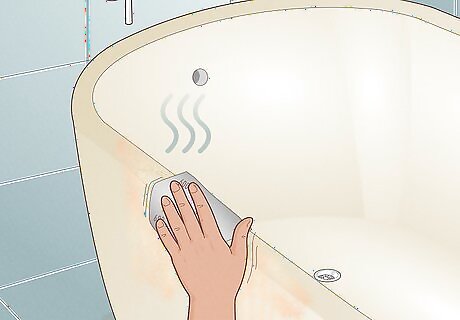
Let the epoxy dry and sand the area with 400 to 600 grit sandpaper. Follow the directions on your epoxy kit to let it fully dry. Remove the painter’s tape around the chip and spray the area with water. Gently sand the surface with 400- or 600-grit sandpaper until it feels flush with the rest of the tub. Some epoxy compounds set within 2 to 3 hours. Other kits may advise you to wait up to 24 hours before sanding. If you can still feel the chip after sanding, apply more compound and repeat this process. After you’re done, rinse away any dust from the sanding process or wipe it down with a damp towel and your tub is ready to use!
Refinishing Badly-Damaged Bathtubs
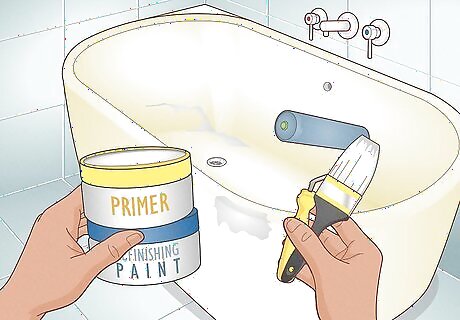
Buy a bathtub refinishing kit at a home improvement center. Most kits come with tub cleaner, sandpaper, primer, refinishing paint, a paint tray, a brush, and a roller. If your kit only comes with paint, you may need to purchase additional supplies. Buy a caulk gun and shower caulk to finish the job. Check that the kit comes with a durable resin coating for your tub. Some cheaper kits come with an epoxy coating, which can chip and discolor faster. Refinishing kits can cost from about $30 to $150. The average cost to hire a professional is about $480. Tub refinishing kits work to refinish all kinds of bathtubs including ceramic, porcelain, acrylic, fiberglass, and enamel tubs. The kits will provide a new porcelain-like finish to these kinds of tubs.
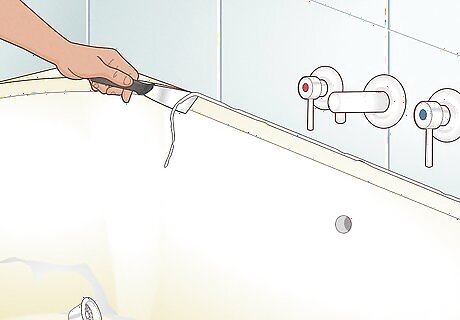
Remove any tub hardware and scrape off the caulking around the edges. Remove the drain cover, lever plate, spout, and handles with a screwdriver. Use a putty knife to scrape away the caulking from the edges of the tub, and an abrasive pad to scrub away any remaining caulk on the bathtub. If your bathtub is connected to a shower, unscrew the spout and handles and remove them from the shower wall. Optionally, use painter’s tape to cover the faucet and drain instead.
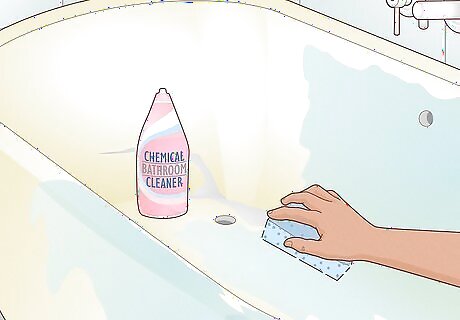
Clean the bathtub with a chemical bathroom cleaner. Use a cloth or sponge to remove any soap scum and stains. If your kit comes with its own cleaner, read the directions on the cleaner to apply it to the tub and use a sponge to scrub it clean. Rinse and dry the tub with a clean cloth. Let the tub completely air dry, or speed up the process with towels and a hair dryer.
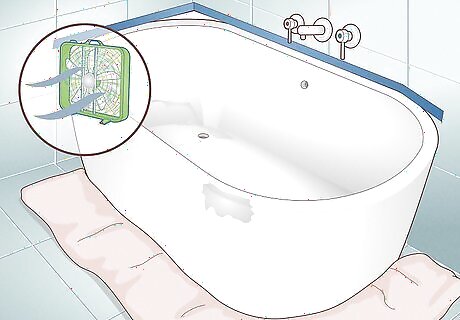
Ventilate the bathroom, cover the floors, and tape the area around the tub. Open up all the windows and put a box fan in a door or window to ventilate the area. Cover the floors with plastic drop cloths to protect them during the refinishing process. Tape off the edges of the wall surrounding the bathtub with painter’s tape. If your tub is free-standing, slide a plastic sheet or drop cloth under or around the base of the tub to protect the floor. If you choose to use a paint sprayer for the tub refinishing process, wrap any objects or surfaces close to the tub with plastic secured with painter’s tape.
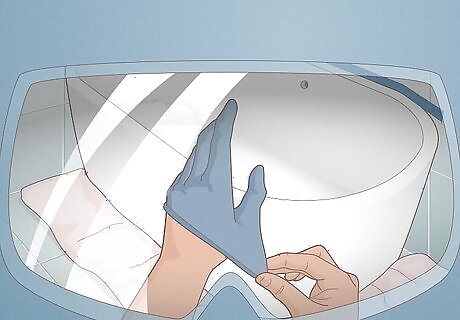
Wear protective gloves, a full-face respirator, and goggles. Some DIY refinishing kits may contain harmful paint stripping agents which can be dangerous to use in an enclosed space. In addition, wear long pants, a long-sleeve shirt, and closed-toed shoes to keep your skin safe from potentially harmful chemicals in the refinishing kit. Make sure to read all the directions provided in the refinishing kit and adhere to all the safety instructions. Try to avoid leaning directly into the bathtub—some chemicals are heavier than air, so they can sink into the tub, putting you at risk of injury or death.
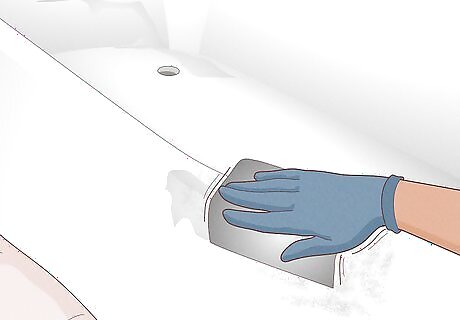
Sand the whole tub with the sandpaper or etching powder in your kit. Starting with the lowest-grit sandpaper, sand the whole surface in circular motions by hand or with an electric sander. Work your way up to the highest-grit sandpaper. If your kit comes with etching powder, apply it to the bathtub and use an abrasive pad to dull the finish. Sanding the tub dulls the finish on the existing coating so it’s easier for the new coating to bond with the tub. If your kit didn't come with sandpaper or etching powder, start with 400-grit sandpaper, then use 600-grit.
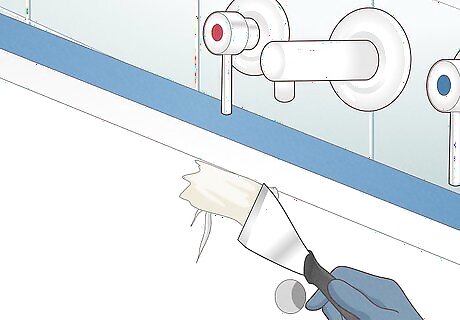
Repair any chips or cracks with an epoxy compound repair kit. Follow the instructions to mix the epoxy. Use a small brush, spatula, or plastic knife to apply thin layers of epoxy to any chips. Wait the instructed amount of time to dry the area and sand the patches down with 2000-grit sandpaper to match the finish of the rest of the tub. This ensures that the tub has no chips or cracks and seals the surface before you apply the new finish. Get a component epoxy chip repair kit from the bathroom remodeling or adhesive section of a home improvement store if your kit did not come with it.
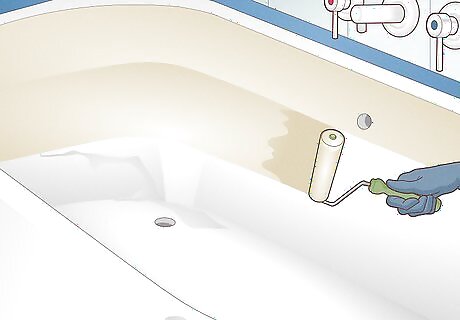
Rinse the bathtub with water and apply primer with a brush and roller. When the putty is dry and the entire tub is sanded down, rinse the tub with water to remove any dust. Use a roller to roll the primer onto the large, flat sections of the tub like the floor and sides, then use a brush to get into the corners and curved parts. Let it dry for at least 2 to 3 hours before you start to paint on the new finish. If your refinishing kit only comes with a reglazer, then you don’t need a primer. Priming the surface is an important part of ensuring that the new finish adheres correctly so that you end up with the correct texture. Make sure that the primer is completely dry to the touch before you paint over it.
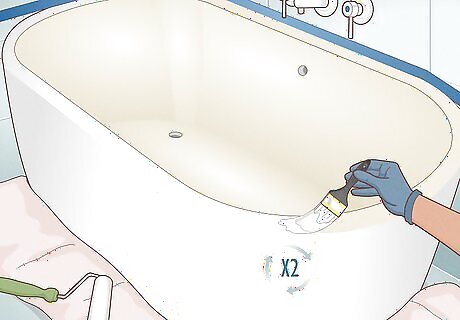
Paint the tub with 2 coats of the epoxy reglazer, a brush, and a roller. Use a roller to paint on the new finish until the flat area of the tub is completely covered. Fill in the corners and curves of the tub with the paintbrush. Let each coat dry for 30 minutes to 1 hour before you put the next coat on. Most bathtubs can be refinished with just 2 coats, but if you’re concerned that the layers are too thin, apply a third coat. Depending on the type of kit you purchased, you may need to follow the instructions on your kit to mix the reglazer before applying it to the tub. Some kits may come with a spray-on finish. If you use a sprayer instead of a brush or roller, try to spray evenly and in 1 direction.
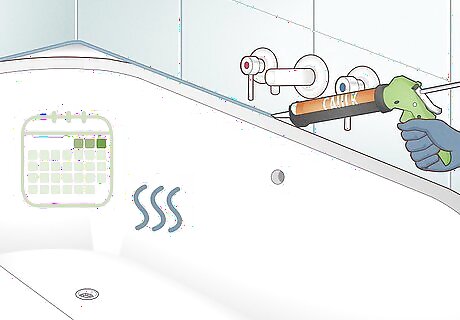
Let your tub dry for 2 to 3 days, then caulk and reinstall the hardware. Most reglazers take 24 to 48 hours to fully cure, but some may take more than 3 days—consult your kit's directions for the exact drying time. When everything is fully cured, reinstall the drain cover, lever plate, tub spout, and handles. Remove the tape and seal the edges with tub caulk. Home renovation and repair specialist Art Fricke recommends staying away from the house for “a couple days… until [the reglazer is] fully cured and all the nasty chemicals have evaporated out of it.” If you don't let the finish dry long enough, you could end up with streaks and bubbles in the new coating and may need to start the process over again. Move the caulk gun along the edges of the tub slowly to ensure an even bead, then allow the caulk to dry at least 24 hours before you use it. Your new DIY finish can last 10 to 15 years.




















Comments
0 comment